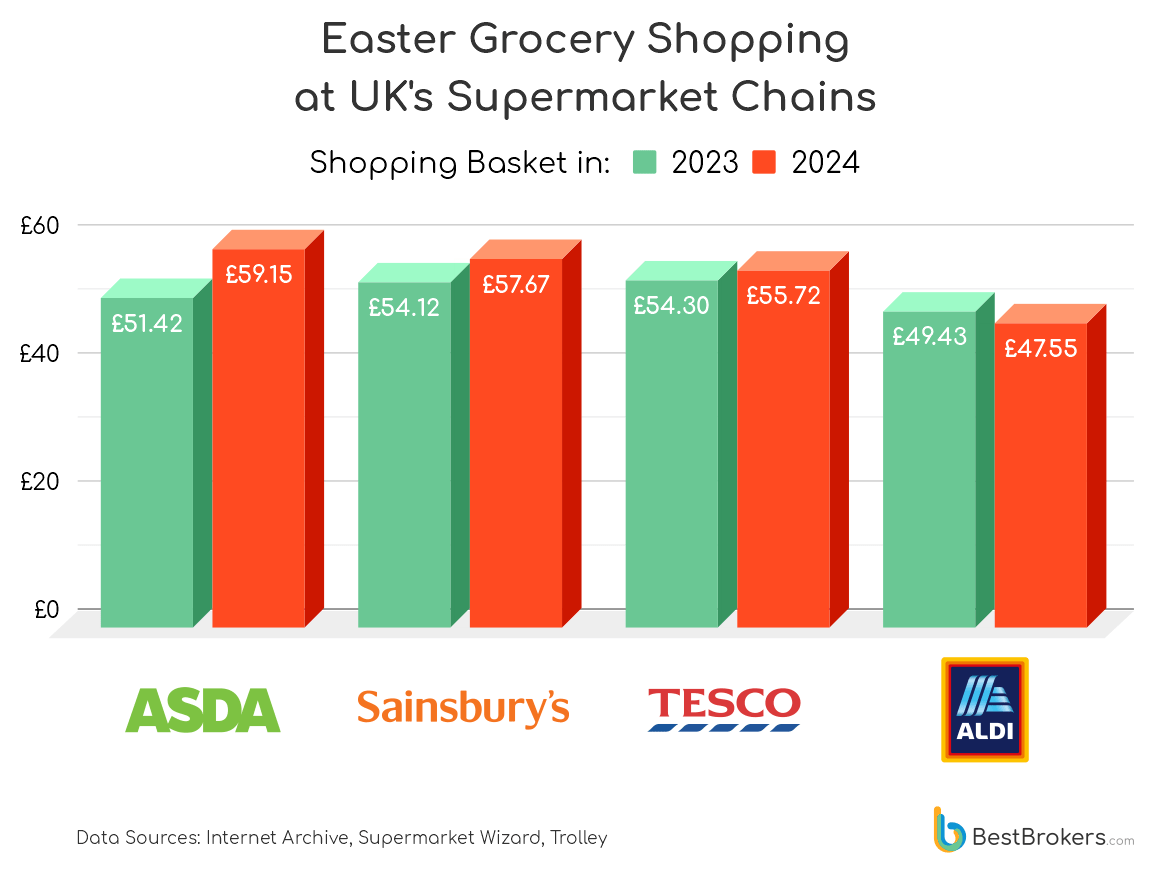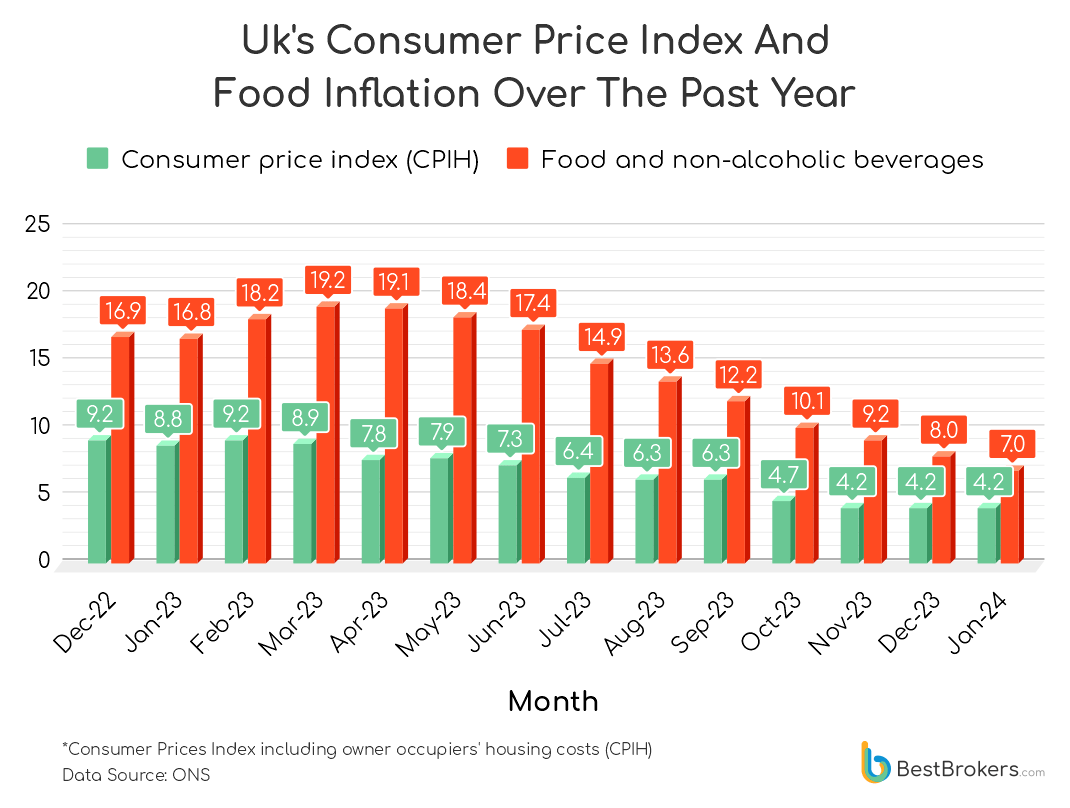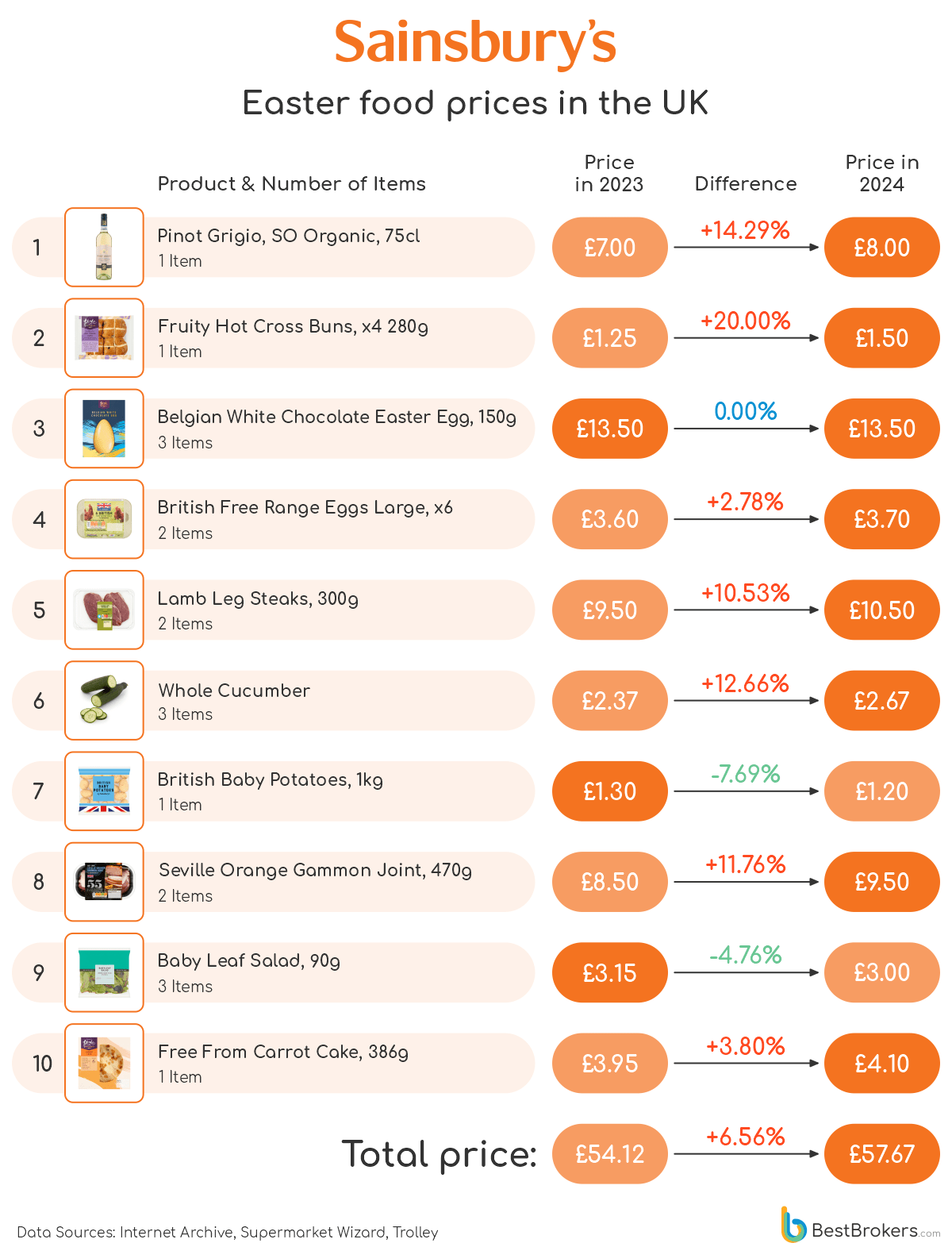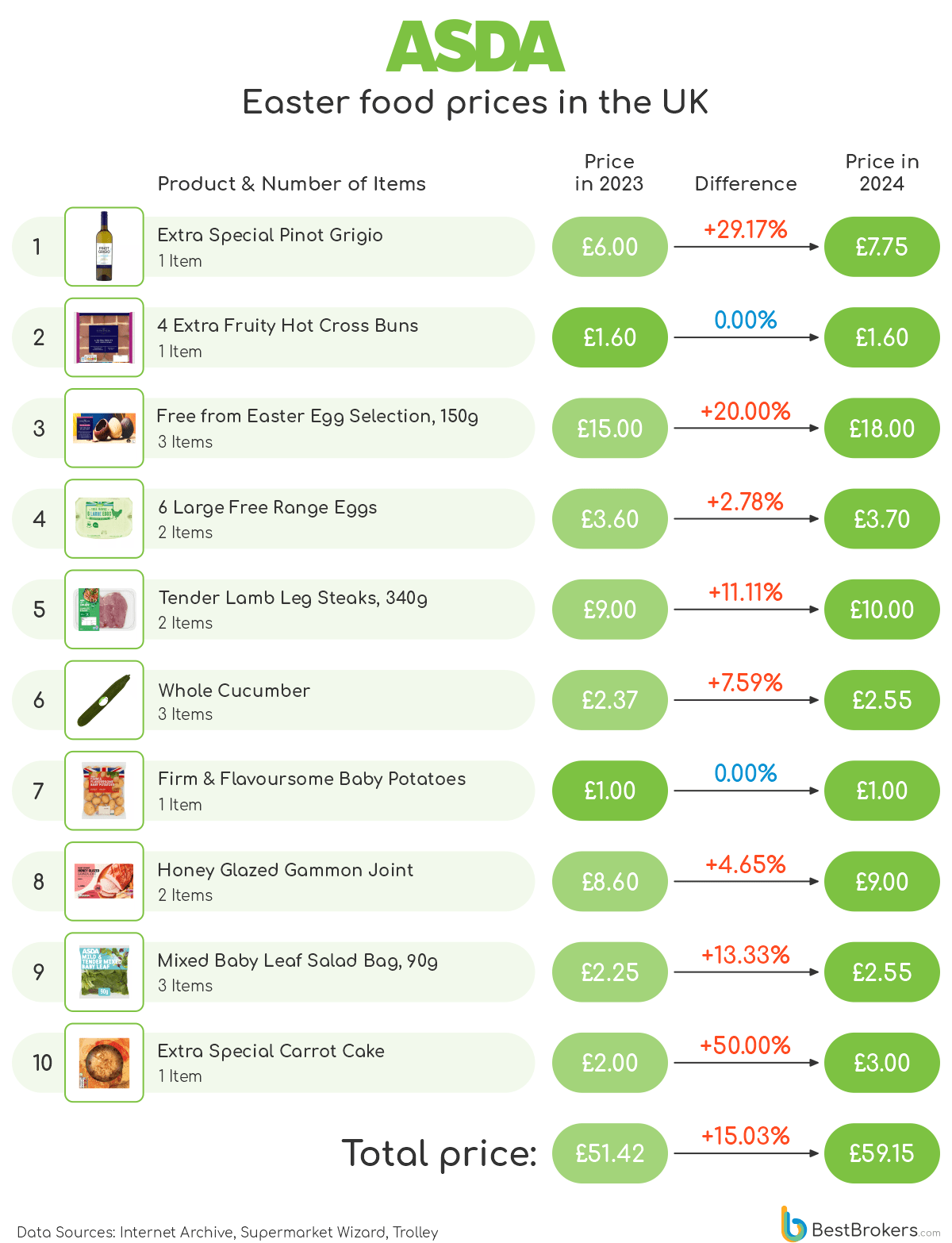With Easter almost here, many are planning their holiday and already looking for special offers for Easter eggs and reasonably priced meat. A good festive celebration cannot go without an Easter roast, spring veggies, and the kids’ favourite egg hunt. Over the last couple of years, however, due to the unprecedented inflation rates and increased prices, many Britons have cut back on their grocery spending.
Despite the slowed inflation at the start of the year – food and non-alcoholic beverages rose 7% year-over-year (YOY) in January 2024, compared to the 8% rate in December, food prices are still increasing. Low-income households have been affected the most, with 15% of UK households experiencing food insecurity in January, according to the Food Foundation.
This suggests that many would not be able to afford a nutritious meal for Easter, which prompted the team at BestBrokers to look into the prices of some of the most commonly bought groceries for the holiday. We took ten traditional Easter foods and checked how much their prices in the UK’s most popular supermarket chains rose from last year.
It turns out that, on average, Britons will now have to pay 5.17% more for the items in the shopping basket we’ve assembled, compared to last year. Easter shopping in Asda has increased the most from 2023, (up 15.03%), while in Aldi, the prices have slightly dropped (by 3.80%).

Inflation in the UK and Its Effect on Grocery Shopping
Following the COVID-19 pandemic, annual inflation in the United Kingdom surged to 19.2%, a 45-year record, in March 2023. Although levels have been steadily declining since then, according to the House of Commons Library, consumer prices in January 2024 were roughly 4.2% higher than they were in January 2023. Alcohol and tobacco products rose 12.2% YOY, whereas food prices increased by 7%.
While food inflation is, indeed, lower than it was a year ago, this does not mean that prices have fallen. On the contrary, they continue to go up, only at a more sluggish pace. The Office for National Statistics (ONS) reports that for the average UK household, the cost of food in is around £103 per week, an increase of almost 18% over the previous year. Processed meat is the category that Brits spend the most on. On average, £495 a year, or a staggering 12% of the family food budget, is allocated to processed meats like ham, bacon, and sausages. In addition, households in the UK spend slightly more on fruits (£226) and vegetables (£218) than they do on cakes and biscuits (£213).

The consumer price index for food and non-alcoholic beverages reached its peak of 19.2% YOY in March 2023, which was the highest annual rate in over 45 years. Since then it has been declining over the past 10 months, down to 7.0% in January 2024. Despite this fact, during the last two weeks, 40% of adults in Great Britain report spending more than usual on groceries, to purchase what they typically buy, based on a survey by the ONS.
Food and energy are now seeing the greatest price increases, to a large extent as a consequence of political events such as the Russia-Ukrainian war and Brexit. Socio-economic factors such as the increased demand for consumer goods since the COVID-19 pandemic have also played a part. With this at hand, supermarkets are having to go the extra mile to keep their prices affordable for their clients, yet competitive in the market.
Easter Groceries Price Comparison
For the Easter shopping basket, we chose to include seasonal items that are often bought just before Easter and throughout springtime like lamb, cross buns, and spring salads, among others, across four of the UK’s most popular supermarket chains, namely Tesco, Sainsbury’s, ASDA and Aldi. Although most of the prices have changed very little, the consistent trend across all shops is the higher price of cucumbers, eggs, lamb meat, and specialty deserts, making 2024’s Easter menu slightly more expensive, compared to 2023.
The price of eggs has increased throughout all supermarkets by at least 2.78%. Cakes would also cost an average of 18.57% more, while lamb meat is around 8.21% more expensive and the price of cucumbers has risen by 14.40%.
Tesco
Nationwide chain Tesco has proven throughout time that it holds perhaps the most stable prices in the UK market. At £54.30, the shopping basket from Tesco was the most expensive one among the four supermarkets for March 2023. In 2024, the total comes to £55.72. This represents an increase of only 2.62%, which is still under the national inflation rate and is the smallest change in prices among the four supermarkets we looked at, indicating Tesco’s dependability.
Cucumbers are the item with the largest price differential of 18.67%. Tesco’s price for a pair of lamb chops has increased by 6.52% since last March and for carrot cake, buyers would have to pay 9.33% more (from £3.75 last year to £4.10 now). The only two products where the prices have dropped are a bottle of Pinot Grigio (-3.13%) and a packet of mixed-leaf salad (-9.09%).

Sainsbury’s
As one of the oldest supermarket chains in the UK, Sainsbury’s has a loyal clientele, which has stuck to the brand throughout the years. Based on our research, the Easter menu here would cost you 6.56% more now compared to last year. In 2023, the ten products we checked cost a total of £54.12, while this year, the price totaled £57.67. This makes Sainsbury’s the supermarket with the second-highest increase in prices in 2024 from the four we assessed.
Sainsbury’s fruity hot cross buns rose from £1.25 to £1.50, which might seem like an insignificant increment, but equals a 20% increase. The item with the second-highest price increase is a bottle of Pinot Grigio 75cl from £7.00 to £8.00 (or 14.29%). The cost of Sainsbury’s meats has increased quite noticeably as well, with their lamb leg steaks costing 10.53% more in 2024 (from £4.75 to £5.25), and their ready-to-roast gammon joint, which rose by 11.76% (from £4.25 to £4.75).
Baby potatoes, one of the most popular foods in the UK around springtime, dropped in price by -7.69% (from £1.30 to £1.20) at Sainsbury’s. The only other item with a price decline is a packet of baby leaf salad which went from £1.05 to £1.00 (-4.76%).

Asda
According to the data we gathered, Asda has the highest price increase out of the four supermarkets, amounting to 15.03% for the ten products in our shopping basket. While in 2023 all the items could be bought for £51.42, in March 2024, they cost £59.15. Interestingly, Asda is the only supermarket chain that doesn’t have a price reduction on any of the items on our list.
The biggest price difference, at 50% (£2.00 to £3.00) is for carrot cake. A bottle of Pinot Grigio is 29.17% more expensive (from £6.00 to £7.75), while a packet of three Easter eggs rose by 20% (£5.00 to £6.00). The cost of other products has increased less significantly like Lamb Leg Steaks which are priced 11.11% higher (from £4.50 to £5.00). The hot cross buns (£1.60) and the baby potatoes (£1.00) have not changed at all.

Aldi
The German supermarket chain leaves no room for competition when it comes to low prices. Not only do some of the items cost a lot less when compared to the other three shops, but the cost of the shopping basket in our research has dropped by -3.80% between 2023 and 2024. The biggest difference of -27.53% is in the price of a Pinot Gris 75cl (from £7.99 to £5.79) and next up is a gammon joint which now costs buyers -12.53% less (from £3.99 to £3.49).
The lamb chops at Aldi cost only 4.66% more in 2024 than the year before.
The only two-digit price increase is for cucumbers from £0.75 to £0.89 (or 18.67%) and the store’s apple pie from £2.69 to £2.99 (or 11.15%).
The total price for all ten items in March 2023 was £49.43, while in 2024, it comes down to £47.55, sealing Aldi’s place as the go-to supermarket for a bargain this year.

Methodology
To conduct this comparison, the BestBrokers team composed a ten-product list of typical springtime products, purchased around Easter, from four of the most popular supermarkets in the UK: Tesco, Sainsbury’s, ASDA and Aldi. We looked at the supermarket chains with the largest market share and chose those with online stores. Morrison’s was not included since we could not find reliable price data for spring 2023. Lidl was also excluded from our research because it offers no online shopping features.
In order to ensure objectivity in the list, we considered similar products within the same price range. In our shopping basket, we put Easter eggs (3 packets), lamb chops (2 packs), green salads (3 packets), cucumbers (3 whole), hot cross buns (1 pack), eggs (2 packs of 6 large eggs), gammon joint (2 packs), baby potatoes (1kg.), a bottle of white wine (Pinot Gris or Pinot Grigio) and an Easter dessert (for 6 people). To find out how much groceries cost back in March 2023, the team searched for archived pages on the Internet Archive, as well as price comparison sites such as Trolley and the Supermarket Wizard. We compared those prices to the prices in March 2024 and calculated the difference.